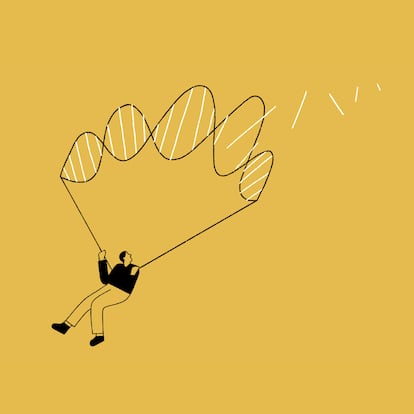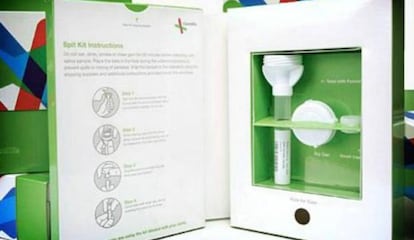The unpleasant surprises of genetic ancestry testing
Some customers don’t like what they find, and certain DNA businesses share their data with pharmaceutical companies and law enforcement agencies

The business of DNA testing for ancestry is booming, according to a study published in JAMA Insights. The tests have been taken by more than 26 million people worldwide and offer customers the opportunity to find long-lost relatives and learn about genetic predispositions to diseases such as cancer. But they also have drawbacks. Some results can be inaccurate and most of the privacy policies of the genetic ancestry testing companies are inadequate. Should you think twice before sharing your genetic material with a private company?
Wilhelm Gulliksen, a 29-year-old from Santiago de Compostela, in northwestern Spain, took a genetic ancestry test a few months ago. “I was curious to know where my ancestors were really from. Half of my family is Norwegian, the other half Spanish, and I had been told that some came from France,” he said. Gulliksen chose the test offered by MyHeritage, which has more than 104 million customers and promises to pinpoint a person’s origins within 2,114 different regions.
It took two weeks for the DNA test kit to arrive. Gulliksen swabbed the insides of his cheeks for 45 seconds, placed the swabs in the vials provided, and mailed them to the lab. Four weeks later, the results arrived: 52% Scandinavian, 26% Iberian, 18% Italian and 4% Northern European. “I wasn’t expecting the 18% Italian,” he says. “I had been told I had French ancestors.”

The tests start at around $50 and compare an individual’s genome with a “reference” set of people from different populations, says Gencove CEO, Joseph Pickrell. “If a company has a database of people from Basque country and southern Spain, it compares your genome to those individuals to determine if you are more closely related to one group than the other. For example, it might conclude that your ancestry is more Basque than southern Spanish.”
In addition to identifying the geographic regions a person comes from, they can also indicate a person’s genetic traits. “Hair color, curly or straight hair, eye color,” says Ana Basterrechea Salido, a 26-year-old who took the test offered by 23andMe. She also took the test because she wanted to know more about her ancestors: “I’m always asking my grandparents about them. I’ve collected some photos, and I’m creating a family tree.”
Finding relatives and revealing secrets
DNA matching can help people find relatives, even distant ones like fourth or fifth cousins, according to the study published in JAMA Insights. This information can be particularly useful for people with unknown genealogical ancestry, such as adoptees and descendants of forced migrants.
But these tests can also reveal information that some people would rather not know. Christopher Slobogin, a law professor at Vanderbilt University (Tennessee, US), said, “For example, [they may learn] that they are from a different racial group than they thought, or that they have half-brothers or sisters they didn’t know about, suggesting that they are a product of a sperm bank, or that one of their parents had an affair or a previous marriage.”
Some people have discovered facts about their family history that were kept secret for fear of discrimination, says Pickrell. “In fact, I’m one of them.” The Gencove CEO discovered that one of his great-grandfathers was a Polish Ashkenazi Jew who immigrated to the United States in the early 20th century. An even more astonishing case was reported by the Washington Post a few years ago. Alice Collins Plebuch, an American who took a DNA ancestry test in 2012, found out that her genetic heritage was not 100% Irish, as she thought. Her results revealed a mix of European, Middle Eastern and Eastern European Jewish genes. After doing some genealogical research on her own, she learned that her father was not the biological son of his parents – as an infant, he had been sent home from the hospital with the wrong family.
In theory, some tests can also detect certain inherited health conditions, such as sickle cell anemia (a disorder of the red blood cells) and cystic fibrosis (one of the most common chronic lung diseases in children and young people). The tests claim that they can identify clusters of genes linked to an increased risk of developing heart disease or certain types of cancer. But, according to a study published in JAMA Internal Medicine, these tests cannot indicate with certainty whether someone will experience health problems. “At-home tests do not screen for every possible risky gene, and results may not always be accurate,” the authors note.
Pharmaceutical companies and law enforcement agencies
What are the implications of private companies having your genetic data? Each company has its own policy on how it handles this data. Basterrechea did inquire about what 23andMe could do with her data, but Gulliksen didn’t pay much attention to this issue. “I’m pretty trusting, and I’m not too worried about what they might do with my genetic data. But I understand that others might have that concern,” he says.
Some companies don’t require a person’s explicit consent to share data with pharmaceutical companies and law enforcement agencies. Slogobin claims that some companies often sell DNA profiles and personal information for medical and other research purposes. In 2018, 23andMe struck a $300 million drug development deal with GlaxoSmithKline, one of the world’s largest pharmaceutical companies. “While these DNA profiles are usually de-identified, it’s often possible to re-identify a person,” says Slogobin. When that happens, personal health issues could be revealed to third parties.
Law enforcement agencies have also used genetic databases to solve crimes. FamilyTreeDNA acknowledged in 2019 that it provided customer data to the US Federal Bureau of Investigation (FBI). Genetic information can help identify or exclude criminal suspects, and was used to catch one of the most savage serial killers of the 1970s in the United States. Between 1976 and 1986, a stranger terrorized California, murdering 13 people and raping 50 women. Ex-cop Joseph James DeAngelo, Jr. – the Golden State Killer – was found guilty on all charges in 2020, two years after he was identified with information from a private DNA database.
Tu suscripción se está usando en otro dispositivo
¿Quieres añadir otro usuario a tu suscripción?
Si continúas leyendo en este dispositivo, no se podrá leer en el otro.
FlechaTu suscripción se está usando en otro dispositivo y solo puedes acceder a EL PAÍS desde un dispositivo a la vez.
Si quieres compartir tu cuenta, cambia tu suscripción a la modalidad Premium, así podrás añadir otro usuario. Cada uno accederá con su propia cuenta de email, lo que os permitirá personalizar vuestra experiencia en EL PAÍS.
¿Tienes una suscripción de empresa? Accede aquí para contratar más cuentas.
En el caso de no saber quién está usando tu cuenta, te recomendamos cambiar tu contraseña aquí.
Si decides continuar compartiendo tu cuenta, este mensaje se mostrará en tu dispositivo y en el de la otra persona que está usando tu cuenta de forma indefinida, afectando a tu experiencia de lectura. Puedes consultar aquí los términos y condiciones de la suscripción digital.









































